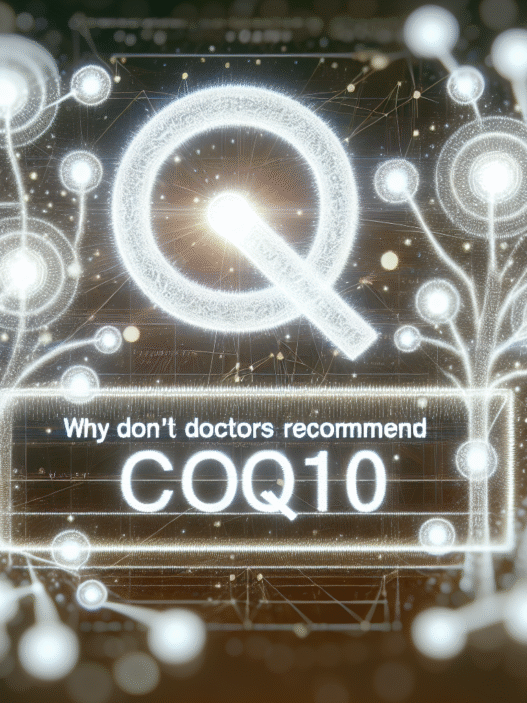CoQ10 Basics
What is CoQ10?
Coenzyme Q10, known as CoQ10, hangs out in nearly every cell of your body, pulling its weight as a natural antioxidant. These little workhorses are vital for energy production within mitochondria, the cell’s personal power plants. Simply put, CoQ10 helps take the nutrients we consume and cranks them into energy, keeping our bodies ticking and feeling their best.
As we age, the life of the party—our CoQ10 levels—start to dwindle. This drop might leave us feeling a bit sluggish and can stir up a few health grumbles, acting like that friend who can’t keep up on a hike. Keeping CoQ10 levels in check is a big deal, especially for folks aged 35–65 who are keen on keeping themselves spry and managing their weight like pros.
Importance of CoQ10 Levels
Having enough CoQ10 is more important than finding your car keys when you’re late. Top of the list: CoQ10 is the brains behind adenosine triphosphate (ATP) production—a fancy term for the cell’s energy piggy bank. If CoQ10 is low, your energy might dip too, making you feel worn out faster than a smartphone battery.
But CoQ10 doesn’t just stop at energy. It’s also got your back as an antioxidant, fending off pesky free radicals eager to wreak havoc on your cells. This cell-shielding power becomes even more crucial as the years add up, since oxidative stress is a one-way ticket to aging and health issues galore.
CoQ10 is also a heart-helper, doing its bit to keep the ticker in top condition. It might even lower your blood pressure, chase away migraines, and offer some peace of mind for those juggling age-related challenges like Alzheimer’s and Parkinson’s.
Factors that tinker with CoQ10 levels include:
| Factor | Effect |
|---|---|
| Age | CoQ10 tends to take the back seat as we get older. |
| Genetics | Some folks are just wired to produce less CoQ10. |
| Health conditions | Conditions like heart disease might hog CoQ10. |
| Medications | Statins, common for managing cholesterol, might swipe some CoQ10 (Mayo Clinic). |
Spotting the signs of a CoQ10 shortfall can better steer you toward good health practices. If you’re curious (like a cat) about those symptoms, check out what are the symptoms of needing CoQ10?.
Age-Related Decline
CoQ10 Levels with Age
As folks get older, CoQ10 — that powerhouse keeping cells energized — starts to take a nosedive. Why? Your body’s making less and breaking it down faster, causing some cellular chaos (International Journal of Molecular Sciences). By the time you’re hitting those golden years, CoQ10 might be in short supply. Throw in a not-so-great diet and your body’s sluggish production, and you’re looking at a pretty clear deficiency.
| Age Group | Average CoQ10 Levels (ng/mL) |
|---|---|
| 20-30 years | 1,500 – 1,800 |
| 30-40 years | 1,200 – 1,500 |
| 40-50 years | 900 – 1,300 |
| 50-60 years | 600 – 800 |
| 60+ years | 300 – 500 |
Between the ages of 35 and 65, don’t be surprised if you’re feeling a bit of that drop. It’s not just natural aging taking a toll; it’s also a decline in how lively and peppy you’re feeling. If staying spry and fit is on your agenda, it pays to keep an eye on those CoQ10 numbers.
Impact of Conditions and Statins
Got a few health problems? They might be siphoning off your CoQ10 stash. Heart issues, fibromyalgia, diabetes, even Alzheimer’s – they all rob your system of this vital nutrient, which can crank up the aggravation of these conditions (NCBI Bookshelf).
Then there are statins, those drugs keeping your cholesterol in check. While they stop cholesterol, they also unintentionally put the brakes on CoQ10 production. So without any extra help – like supplements – you’re gambling with muscle aches or worse.
| Condition/Medication | Effect on CoQ10 Levels |
|---|---|
| Heart Disease | Decreased |
| Fibromyalgia | Decreased |
| Diabetes | Decreased |
| Statins | Decreased |
| Alzheimer’s Disease | Decreased |
If you’re in that 35-65 age bracket thinking about health goals or trying to shed a few pounds, it might be smart to check in on your CoQ10. Supplements could offer some much-needed backup. Curious about what else CoQ10 can do? Click on over to learn more about what is coq10 recommended for? and discover how it supports various health dilemmas.
Symptoms of CoQ10 Deficiency
Knowing how to spot CoQ10 deficiency might be a game-changer, especially for folks mindful of aging and shedding some pounds. The signs can pop up in many ways, messing with both mind and body feats.
Recognizing CoQ10 Deficiency
Paying attention to your body’s distress signals is a smart move. CoQ10 deficiency comes with a list of tell-tale signs that aren’t just a minor nuisance:
- Encephalopathy (think brain fog but scarier)
- Seizures (yep, not just in the movies)
- Dystonia (all about those unexpected muscle twists)
- Spasticity (think tight muscles that won’t relax)
- Intellectual disability (it could slow you down more than you think)
These brainy clues can vary quite a bit. Picture everything from baby challenges, like floppy muscles, to getting hit with serious brain aging hits once you’re older. Such setbacks don’t just disrupt daily life—they yank down the curtain on your overall zest for life.
Effects on Brain and Muscles
Running low on CoQ10 can be a real bummer for your muscles, putting a damper on simple daily stuff. Some muscle signs linked to this shortage?
- Weakness (feeling like you’ve got jelly arms or legs)
- Exercise intolerance (goodbye, morning jogs)
- Muscle biopsy findings showing fat building up
- Mitochondrial crowding (yep, even the tiny powerhouses get affected)
Don’t overlook heart troubles like hypertrophic cardiomyopathy (HCM) or kidney issues—stubborn nephrotic syndrome that laughs at steroids could be lurking. Nab these symptoms early, and you might keep serious health woes at bay (Source).
For those keen to dive deeper into CoQ10 and its benefits, check out topics like what is CoQ10 good for? and can CoQ10 help you lose weight?. Grabbing this intel is key for tackling symptoms and upping your health game.
Health Benefits of CoQ10
CoQ10’s got some serious street cred as a wellness champ. Best known for giving the heart a boost and keeping migraine monsters at bay, there’s more to this wonder nutrient. This spot’s all about how CoQ10 might just be your new best friend in health and beyond.
CoQ10 for Heart Health
When it comes to heart health, CoQ10 seems to be like a backstage crew member making sure everything’s running smoothly. It’s believed to help your ticker by jazzing up those mitochondria—the little powerhouses in your cells. For folks dealing with heart failure, a CoQ10 boost has shown to ease symptoms and get that heart working better. Throw in some evidence that it helps with blood flow and heart squeeze power, and it’s a pretty good deal.
Here’s a quick peek at what researchers say CoQ10’s doing for hearts:
| Benefit | Are We Seeing It? |
|---|---|
| Eased Symptoms | Yup |
| Fewer Big Bad Heart Events | Yep |
| Better Functionality | You bet |
| Healthier Vessels | Sure thing |
| Stronger Heart Squeeze | Absolutely |
Plus, it might help bring those blood pressure numbers down a bit, which makes your doc happy (Ro).
Role in Migraine Management
Got a migraine that just won’t quit? CoQ10 might be part of the hero squad. Some studies hint that CoQ10 can cut down on those head-pounding sessions, especially for kids and teens with low levels of the stuff (NCBI Bookshelf). If migraines have you down, popping some CoQ10 could be a natural way to fight back.
Other Health Benefits
CoQ10 isn’t just a one-trick pony. It’s got anti-inflammatory mojo that could help out with bothersome joint aches and pains (is coq10 anti-inflammatory?). There’s also a whisper that CoQ10 might lift your mood if you’re struggling with certain mental health issues like depression while managing bipolar disorder.
When all’s said and done, thinking about symptoms that shout for more CoQ10 might give you a game plan for feeling better, especially as the years tick by. Tapping into CoQ10’s perks may just set you on a path to happier, healthier living.
CoQ10 Supplementation
Supplement Safety
Coenzyme Q10, or CoQ10, is usually a safe bet for most folks. The Mayo Clinic says there are not many side effects, and they’re mostly mild tummy troubles if they do pop up. But, a little heads-up: CoQ10 can mess with some meds, so it’s smart to chat with your doctor before loading up on CoQ10 supplements.
When it comes to expecting or nursing moms, safety remains a bit of a grey area. Best practice is to keep it out of the routine unless a doctor gives the green light. Concerned about CoQ10 mixing it up with your vitamin shelf? Just so you know, some vitamins don’t mix well with CoQ10, and that’s worth checking out.
| Safety Considerations | Information |
|---|---|
| General Safety | Safe, minor side effects |
| Common Side Effects | Mild digestive issues |
| Interactions | Possible with certain meds |
| Pregnancy/Breastfeeding | Consult your doctor |
Dosage Recommendations
Finding the right dose of CoQ10 is like finding the right pair of shoes—it depends on what fits. If you’re tackling a primary CoQ10 shortage, you might need a hefty dose, somewhere between 5 to 50 mg for every kg of body weight a day. Jumping on supplementation sooner rather than later can help keep problems at bay and turn some symptoms around, according to NCBI.
For those after overall wellness or shedding a few pounds, you’ll often see dosages around 100 to 300 mg per day. Newer insights—including the 2022 ACC/AHA/HFSA guidelines—lean towards sticking with CoQ10 for the long haul to get perks like cutting down heart failure risks or pumping up heart health (NCBI).
| Dosage Type | Recommendation |
|---|---|
| General Health | 100 – 300 mg daily |
| Primary CoQ10 Deficiency | 5 – 50 mg/kg daily |
It’s good sense to double-check with a healthcare provider to get the dosage just right for your needs. If you’re pondering CoQ10’s benefits for things like weight loss or easing up that joint discomfort (Does CoQ10 help with joint pain?), dialing in the right dosage could really crank up its effectiveness while dialing down the risks. Also, don’t skip reading up on what happens if you skip CoQ10 while on statins for some extra insights on the dos and don’ts.
Food Sources of CoQ10
You know what a big deal a good diet is, right? Especially if you’re in that 35-65 age bracket, trying to fight off those pesky aging signs or shed some pounds. Coenzyme Q10, or CoQ10 as all the cool kids call it, is freaking important, and it turns out food can do a lot to keep your levels topped up.
Natural Food Rich in CoQ10
Let’s cut to the chase—here’s your go-to list for foods that pack a CoQ10 punch:
| Food Category | Food Sources |
|---|---|
| Organ Meats | Kidney, Liver |
| Fatty Fish | Sardines, Salmon, Trout, Mackerel |
| Meats | Chicken, Beef, Pork |
| Veggies | Spinach, Broccoli, Cauliflower |
| Fruits | Strawberries, Oranges |
| Oils | Soybean, Canola |
| Legumes | Soybeans, Lentils, Peanuts |
| Nuts and Seeds | Pistachios, Sesame Seeds |
| Whole Grains | You’ll wanna stick with the basics here |
And don’t ignore those organ meats—they’re the rockstars of CoQ10, for sure. Mix up your meals with this variety and your CoQ10 levels will thank you.
Importance of Dietary CoQ10
Just why do you need this stuff? Well, it’s like the secret sauce for your body’s energy production and cell maintenance. And let’s not forget: if you’re on those statin meds, you might lose some of that CoQ10 magic (Ro). Boosting your intake could really help keep your wellbeing in check.
Supplement vs. Food Absorption
So, what’s better—getting your CoQ10 from food or popping a pill? Capsules are usually what you’ll find, and they start around 90 mg a day but can go higher if you’re dealing with specific issues. Ubiquinol, the “better-than” version, is supposed to absorb more easily (Ro). Here’s the kicker: if you’re taking CoQ10 with fatty meals, you’re golden on absorption. So, it’s not just what’s inside the capsule; it’s how you eat it that counts.
Taking CoQ10, either from foods or a bottle, is solid as you age. If you’ve been wondering “do I need more CoQ10?” don’t stress too much. Aim for a balance with these tasty sources and keep your levels where they ought to be.





















